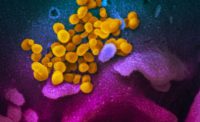How the Rainforest Alliance responded to COVID-19 in 2020
New annual report details organization’s 2020 response to the pandemic, which included grants and re-imagined trainings.

When countries around the world went into lockdown in March 2020, supply chains crumbled overnight — throwing the rural communities that partner with the Rainforest Alliance into extreme financial uncertainty.
Farmers couldn’t travel to market to sell their crops.
Cooperatives couldn’t export goods internationally.
Crop prices plummeted amid global instability.
Shortages of face masks and sanitizers delayed harvests and put workers at risk.
Incomes also took a massive hit.
The organization’s community partners did not have the financial resources to weather such a sudden and severe loss of income. In Peru, coffee farmers who couldn’t sell their beans resorted to bartering coffee for food.
That’s according to the recently released Rainforest Alliance 2020 Annual Report: We Thrive Together. During the crisis the organization sprung into action.
“From emergency grants to virtual farm trainings and more, we are continually seeking impactful ways to support our frontline community partners through this crisis,” the report said.
For example, in April 2020 the group launched an emergency fundraiser in support of frontline community partners.
“The members of our alliance gave generously despite widespread financial hardship and uncertainty brought on by the pandemic,” the report said. “We raised $36,000 from our supporters and we contributed another $44,000 —enabling us to distribute $80,000 in logistical support and relief grants to longstanding partner communities across Latin America, Africa, and Asia.”
Specifically, its COVID-19 Relief Grants went toward:
• Distributing thermometers, protective gear and sanitation kits
• Trainings on COVID-19 health and safety measures
• Providing food for struggling farmers and their families
• Investing seed capital to help smallholders and forest enterprises restart activities
• Continuing our farmer trainings remotely via radio broadcasts and mobile apps
“Yes, there’s no denying that it was a deeply painful year—one of separation, loss, and tremendous financial hardship for people all around the world. But as the [report shows], 2020 was also a year of untold generosity, human kindness, accelerated innovation, and far reaching collaboration,” the Alliance said. “These are the qualities and conviction we need to take on the daunting global challenges before us, from pandemics to rural poverty and the climate crisis.”
The organization also shifted its approach to trainings.
“When lockdown restrictions forced many of our regional teams to suspend face-to-face agricultural trainings with farmers, we needed to come up with innovative alternatives — and fast,” the Alliance said. “We pivoted to online trainings where possible, but many of our community partners live in remote areas with limited internet access. The solution: We started recording audio trainings for broadcast over radio and public address systems. For our most vulnerable partners, these broadcasts have been vital — providing practical guidance on how to implement sustainable growing practices that can boost yields and improve their incomes.”
Overall, the Alliance was able to help cocoa farmers around the world navigate a tumultuous year. And in 2020 companies bought enough Rainforest Alliance or UTZ certified cocoa to make — every day — more than 80 million bars of chocolate.
“When placed one after the other, this adds up to almost twice the length of the Amazon River,” the Rainforest Alliance said.
As part of its cocoa-specific program, the Alliance joined forces with Twin, Divine Chocolate, and Imaflora to strengthen smallholder farmer groups across Brazil, Indonesia, Sierra Leone, and Liberia.
“This four-year partnership created market opportunities for more than 4,000 smallholders in four countries by connecting them with big traders and manufacturers with the resources to invest in more sustainable production at scale,” the Alliance said.
For the full 110-page report, which includes detailed sales and production statistics, as well as more in-depth information about the group’s COVID-19 grant distribution and its goals for the coming decade, visit the Rainforest Alliance website.
Looking for a reprint of this article?
From high-res PDFs to custom plaques, order your copy today!






